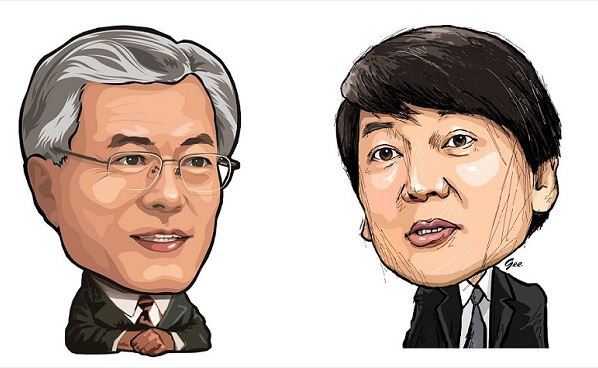The forthcoming showdown between Moon Jae-in and Ahn Cheol-soo for this year’s presidential race may be deja-vu for South Korean voters, especially those who cast ballots in the 2012 election.
The difference this year is that the two do not have a shared enemy, as the conservative front is split and faltering after former President Park Geun-hye’s corruption scandal and subsequent fall from power.
Rather, Moon and Ahn, representing liberals and centrists, are uncompromising rivals for the top office, with Moon leading and Ahn chasing.
In 2012, as runners-up to Park, then a formidable conservative front-runner, the two consolidated their candidacy one month before the vote, with Ahn withdrawing from the race to endorse Moon in an ultimately unsuccessful bid to stop Park Geun-hye.

Caricature of Moon Jae-in (L) and Ahn Cheol-soo
As the nation’s five main political parties have ended their presidential primaries, the presidential race is shaping up into a competition between Moon of Democratic Party of Korea and the Ahn of the People’s Party.
According to the survey released by pollster Realmeter on Monday, Moon kept his lead with 34.9 percent support, followed by Ahn who recorded 18.7 percent, up 6.1 percentage points from the previous week.
The lack of ranking conservative candidates, unlike the 2012 race in which conservative candidate Park had a steady lead, has drawn attention to the Moon-Ahn contest.
Making his second bid in the presidential race, Ahn was apparently well aware that his priority was to stand out from the crowded fields of nearly 20 minor contenders and to be seen as equal to front-runner Moon.
“This (year’s) presidential election shall be a (two-way) battle between Ahn Cheol-soo and Moon Jae-in, in which I am confident of winning,” Ahn said in January, well before the May 9 election date was decided.
The presidential aspirant thereby made it known that he would neither quit the race midway, nor join forces with Moon and the Democratic Party.
Scars from 2012During the four years of the Park administration, expectations persisted that Moon and Ahn may come together in order to maximize the winning chances of the liberal opposition and to achieve their common political goal -- a change of state power.
Backing up such hope was that the two indeed consolidated their camps in the 2012 presidential election and later unified their parties, in the form of Ahn joining in the then-Democratic Party.
These merger attempts, however, not only ended in failure -- Ahn left the DP to found his own People’s Party -- but also left emotional scars on both rivals.
One of the most fundamental conflicts is their differing views on why their hard-achieved candidacy unification in 2012 didn’t lead to an election victory. While Ahn’s aides blamed Moon’s party for exerting pressure upon the resignation of Ahn, who they claimed had a better chance of winning, Moon’s camp criticized Ahn for neglecting his vow of full support for Moon.
Moon’s aides frequently pointed out that Ahn never made active efforts to encourage his supporters to back Moon, and also that he left the country on the day of the election, which they saw as a withdrawal from participation.
“It is ungrateful to say (that I did not sincerely contribute to Moon’s election campaigns),” Ahn said in a press conference last month, letting out anger and taking an aggressive stance against Moon.
Incompatible political duoMoon and Ahn, although their paths after the 2012 election have often crossed, differ greatly in their backgrounds.
While Moon was a student activist-turned-human rights lawyer before becoming the chief of staff to his longtime friend President Roh Moo-hyun, Ahn was a physician-turned-IT entrepreneur.
Both joined politics in 2012 with pledges to put an end to the conservative era, then led by President Lee Myung-bak.
Although Moon and Ahn had in 2013-2014 co-chaired the liberal camp -- then named the New Politics Alliance for Democracy, their political inclinations are notably different.
While Moon is left-wingg to the core, having started politics to carry on the unfinished reforms of the late iconic President Roh Moo-hyun, Ahn is seen as a moderate figure -- liberal on some issues but conservative on others.
For this, Moon’s support is seen loyal but not extendable to the center-right, let alone the far-right, while Ahn’s is fluid, with greater expandability.
By Bae Hyun-jung (tellme@heraldcorp.com)






![[Graphic News] More Koreans say they plan long-distance trips this year](http://res.heraldm.com/phpwas/restmb_idxmake.php?idx=645&simg=/content/image/2024/04/17/20240417050828_0.gif&u=)